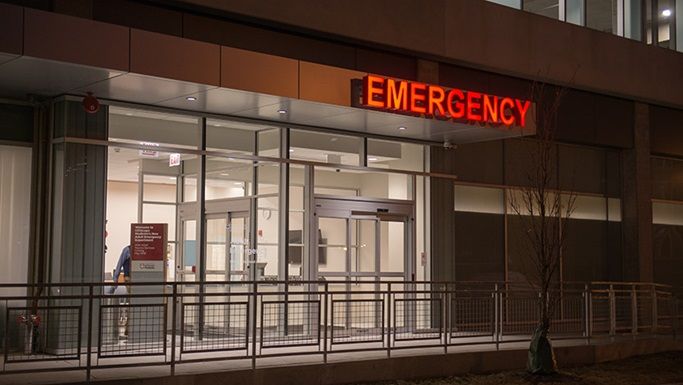October 29, 2020
Written By Thomas Spiegel, MD, MBA, MS
It’s Saturday, and the cold you’ve been nursing for the past few days seems to be getting worse. You’ve vomited once and have a fever. Should you head to a hospital emergency room or an urgent care clinic?
If you’ve ever wondered whether to go to an ER or an urgent care clinic, you’re not alone. As an emergency medicine physician, I’m often asked by family, friends and patients if their symptoms warrant an ER visit, a trip to an urgent care clinic, a call to their primary care doctor or simply management at home.
Especially now as we continue to face the COVID-19 pandemic and the onset of flu and cold season, it’s important to listen to your body and assess the severity of your symptoms to prevent overwhelming hospital emergency rooms with mild illnesses or injuries that could be managed elsewhere. You could also avoid a long wait in an ER waiting room when an ER may not be the level of care you need.
If you are experiencing mild symptoms, such as a temperature below 100 degrees, aches and pains, a mild cough, etc., that could be caused by the flu, COVID-19 or hundreds of other viruses, I would start by “doing what your mom used to tell you” – rest, drink plenty of fluids, take over-the-counter medications like Tylenol, if needed, and monitor your symptoms.
If your symptoms aren’t getting any better over time or worsen, and you feel you need to be seen by a doctor, calling your primary care physician would be beneficial. Many primary care physicians are now offering virtual visits and can assess patients by a phone or video call fairly quickly.
Always remember, if the urgent care provider thinks you need a higher level of care, they will get you to the ER.
For more immediate or after-hours care, a trip to an urgent care clinic can be a great solution. Unless it’s a true emergency, urgent care is generally a better use of a patient’s time and resources. Many of them are open seven days a week, have far shorter wait times than the ER, and cost less than a traditional hospital emergency room visit.
Many urgent care clinics also have advanced diagnostic imaging like X-ray machines and lab capabilities to assess your illness or injury onsite. Urgent care providers can prescribe medications and recommend a higher level of care, if needed.
You should call 911 or come right to the ER if you’re systemically sick – that’s when an illness affects your entire body, and you have severe pain or sudden onset of severe symptoms, a fever that won’t break, or “something doesn’t work,” like you’re unable to move an arm or leg or breathe normally. This includes if a person has a severe injury or allergic reaction, if they pass out or experience any signs of a possible stroke or signs of a heart attack.
UChicago Medicine Ingalls Memorial has several urgent aid locations, a unique hybrid of ER-level care provided in an ambulatory setting 24 hours a day, 7 days a week. Urgent aid centers are designed for patients whose condition or injury requires efficient, high quality emergency services. Unlike urgent care centers, they are staffed exclusively by physicians.
The cost of an urgent aid visit is the same as the emergency department of Ingalls Memorial for the same level of care. The co-pay for emergency services will apply to your urgent aid visit, which may be higher than the co-pay for services provided by urgent care centers that are not part of a hospital’s emergency department.
See the lists below for further clarification on when you should go to the ER versus an urgent care clinic, and learn more about UChicago Medicine’s trauma and emergency services.
When to Go to a Hospital Emergency Room
- Head to the ER or call 911 to have the following symptoms evaluated and treated:
- Shortness of breath
- Chest pain, left arm pain or left jaw pain
- Serious burns and cuts (cuts that won’t stop bleeding or wounds that won’t close)
- Seizures
- Severe allergic reaction (swelling lips, difficulty swallowing or breathing)
- Stroke symptoms, including slurred speech or sudden numbness/weakness in any area of your body, facial droop, loss of balance or vision
- A change in mental status (such as confusion)
- Loss of consciousness (if you pass out)
- Multiple injuries or a possible broken bone in areas like the ribs, skull, face or pelvis
- If you’re pregnant and have vaginal bleeding or pelvic/abdominal pain
When to Go to an Urgent Care Clinic
- An urgent care specialist can evaluate and treat:
- Fevers and colds
- Vomiting and nausea
- Diarrhea
- Dehydration
- Strains or simple bone breaks (when the body part isn’t “pointed” in the wrong direction or — in the case of suspected broken ankles or knees — you can still walk on the injured leg with some discomfort)a
- Minor cuts
- Mild asthma attacks
- Pain with urination
Always remember, if the urgent care provider thinks you need a higher level of care, they will get you to the ER.
Original Article – https://www.uchicagomedicine.org/forefront/health-and-wellness-articles/when-to-go-to-the-emergency-room-vs-an-urgent-care-clinic





